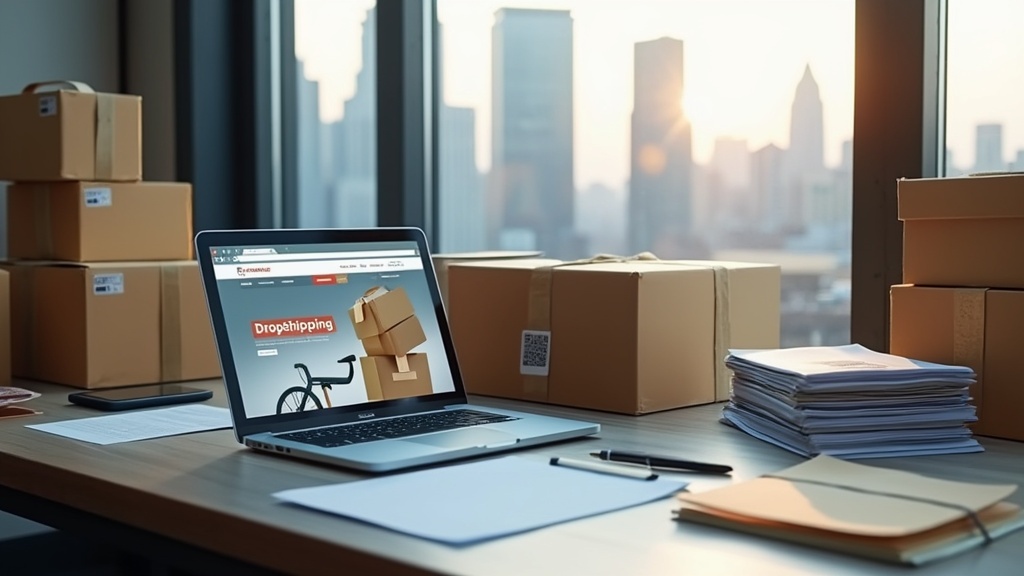Navigating dropshipping customs requirements can make a significant impact on your business success in international commerce. Avoiding costly delays and fines is essential as you expertly manage customs regulations.
Emphasizing compliance requirements ensures not only timely delivery but also enhanced customer satisfaction.
Unlock insights that will elevate your dropshipping strategy and enable your business to thrive in a competitive landscape.
Click here to learn more about: what documents required for international dropshipping
Customs Regulations in Dropshipping
Mastering customs regulations positions dropshippers for success.
Compliance requirements demand adherence to international shipping rules and the provision of precise shipping documentation. Failing to follow regulations risks incurring costly mistakes, including shipment delays and fines.
Leverage the right resources to stay informed on changes that can affect your business. Here are key aspects to ensure smooth operations:.
Key Regulations to Consider
- Import regulations: Ensure compliance with the rules regarding the entry of goods across borders.
- Shipping labels: Accurate labels are critical for streamlined customs clearance.
- Customs declarations: Proper documentation is needed for all imported items to avoid customs fees.
Common Pitfalls to Avoid
Many dropshippers encounter pitfalls that can be easily avoided:.
- Ignoring tariffs: Not accounting for import duties can lead to unexpected costs.
- Incomplete documentation: Lack of necessary commercial invoices and packing lists can cause shipment delays.
- Neglecting classification of goods: Incorrect classification can lead to compliance issues and additional fees.
Stay Updated on Regulatory Changes
Maintaining awareness of evolving customs laws is vital. Key resources include:
- Government websites: Check for updates on regulations and compliance resources.
- Industry forums: Engage with other dropshippers for shared insights on customs compliance.
- Customs experts: Consult professionals who specialize in trade compliance for complex inquiries.
By staying informed and prepared, dropshippers can navigate the complexities of customs regulations and streamline their operations for greater efficiency.

What Are Import Duties And Tariffs
Import costs play a significant role in ecommerce success. Import duties refer to taxes applied to specific goods entering a country, while tariffs encompass broader taxes associated with international trade.
These distinctions are essential in understanding how these expenses impact your overall pricing strategies.
Import duties and tariffs can diminish your profit margins if overlooked.
Savvy retailers must evaluate how these costs factor into their pricing models to remain competitive without compromising profitability.
To budget effectively, research import regulations and use online calculators or consult customs experts for accurate cost estimates.
How Import Duties Impact Pricing Strategies
When considering international shipping, import duties can significantly affect your pricing strategies. Assessing these costs helps you determine the final price point.
This analysis ensures compliance with customs laws while maintaining customer satisfaction through transparent pricing.
Calculating Potential Import Costs Accurately
To calculate import duties accurately, start by researching the classification of goods. Understanding the correct tariff codes ensures compliance and avoids unexpected fees during customs clearance.
Utilizing online tools or consulting with customs experts can streamline this process.
Importance Of Shipping Documentation In Dropshipping
Effective shipping documentation goes beyond mere compliance; it provides a competitive edge.
Essential documents, including Commercial Invoices, Bill of Lading, and Customs Declarations, are critical for smooth customs clearance.
Each document guarantees that your shipments adhere to the relevant customs laws and meet compliance requirements.
Timely and accurate documentation can significantly expedite customs clearance, reducing the risk of costly shipping delays and improving overall customer experience. Common documentation errors, such as incorrect product labeling or missing signatures, can lead to severe setbacks.
Avoid these mistakes by maintaining clear records and meticulously checking all details to enhance your dropshipping efficiency.
| Import Duties | Tariffs |
|---|---|
| Taxes on specific goods entering a country | Broader taxes associated with international trade |
| Can diminish profit margins if overlooked | Impact overall pricing strategies |
| Requires classification of goods for accurate calculation | Ensures compliance with customs laws |
| Essential for budgeting and pricing models | Influences customer satisfaction through transparent pricing |
Navigating Customs Clearance For Smooth Deliveries
Successfully managing customs clearance is essential for enhancing your international shipping efficiency. Begin by familiarizing yourself with the crucial steps involved: initiate with meticulous documentation preparation, ensuring all commercial invoices and packing lists are accurate.
Accurate customs declarations help streamline the submission of customs forms, thus facilitating timely delivery timelines.
Calculating import duties upfront avoids potential delays that may affect your bottom line.
By prioritizing accurate valuations and adhering to customs regulations, your business can sidestep costly fines and expedite the clearance process. Ultimately, staying informed and proactively engaging in compliance measures will position your operations for success in the complex landscape of global logistics.
How To Prepare For Customs Inspections
Cultivating preparedness for customs inspections significantly minimizes your risk of unexpected delays.
Be aware that high-risk products are frequently flagged, and inconsistent documentation invites scrutiny that could slow down your shipment. To ensure readiness, maintain a comprehensive checklist that includes shipping documentation, accurate packing lists, and any required permits.
Training your team on customs compliance fosters a culture of transparency and readiness.
Engaging open communication with customs officials builds your reputation as a trusted partner.
By preparing adequately, you can significantly lower the risk of shipping delays and maintain the integrity of your international trade operations. Don’t leave your success to chance—embrace the importance of preparation today!
Customs Clearance and Inspections
- Proper documentation can reduce customs clearance time by up to 30%.
- Inaccurate customs declarations can lead to fines ranging from 10% to 40% of the shipment’s value.
- Training employees on customs compliance can decrease the risk of shipment delays by 50%.
- Maintaining clear communication with customs officials can enhance your business’s reputation and facilitate smoother inspections.
Role Of Customs Brokerage In Dropshipping
Customs brokerage plays a pivotal role in the dropshipping ecosystem by ensuring that shipments comply with complex regulations. A competent customs broker navigates the intricate landscape of import regulations and tariffs, streamlining customs clearance to avoid delays.
Their expertise is essential; brokers help maintain compliance and mitigate risks associated with international shipping.
When selecting a customs broker, it’s vital to consider their experience with dropshipping and specific merchandise.
An ideal broker should offer technological capabilities for shipment tracking, comprehensive support, and transparent pricing structures.
By making informed choices, businesses can ensure smooth operations and enhance their profitability in the global market.
Choosing the Right Broker
Choosing the right customs broker involves assessing key factors to ensure your international shipping needs are met effectively. Focus on the following:.
- Experience in international trade specific to your product category
- Technological solutions for automated solutions and shipping documentation
- Transparent customs fees and pricing models
- Strong customer feedback indicating high logistics performance
Managing Shipping Costs And Customs Fees
Effective management of shipping costs and customs fees becomes integral to dropshipping success. Understanding customs fees and budgeting for them as part of your pricing model can significantly impact your profit margins. Strategies to reduce costs include:
- Consolidating shipments to enhance efficiency in customs clearance
- Negotiating better rates with shipping carriers to lower shipping costs
Implementing these tactics not only boosts profitability but also aids in balancing tariffs and shipping expenses.
Utilizing shipping management software can provide valuable insights into your expenses, enabling you to identify potential savings. Leveraging automated solutions also optimizes your shipping processes, reducing human errors and enhancing efficiency. Start integrating these strategies today to ensure your dropshipping business thrives in a competitive marketplace.
Customs Brokerage in Dropshipping
- Customs brokers facilitate compliance with import regulations, reducing the risk of delays.
- Businesses that utilize customs brokerage services can enhance their efficiency in international shipping.
- Effective management of customs fees can significantly improve profit margins for dropshipping businesses.
- Utilizing technology for shipment tracking and documentation can streamline processes and reduce errors.
Ensuring Compliance With International Trade Laws
Navigating international trade laws is essential for successful dropshipping operations. Compliance with import regulations significantly enhances your business’s reputation and customer trust.
Key international trade laws, such as customs compliance, require accurate shipment data, which can mitigate risks associated with shipping delays and potential legal penalties.
Noncompliance can lead to severe consequences, including hefty fines and operational disruptions, jeopardizing your brand’s credibility.
To avoid such pitfalls, consider implementing regular training for your team and consulting with customs experts.
Ongoing education keeps you updated on evolving compliance requirements, ensuring you stay ahead of the challenges.
Utilize available resources like online courses and industry webinars to strengthen your knowledge. Engaging actively in compliance education and networking with others in the field will help build a thriving dropshipping business that confidently navigates the complexities of international trade.
Mitigating Risks in International Trade Compliance
Risk mitigation in international shipping involves establishing a clear understanding of customs regulations and maintaining organized shipping documentation.
Missteps during customs clearance can lead to unexpected import duties and penalties that impact your bottom line. Create a robust mechanism for tracking shipment tracking details and maintaining clear records for audits.
Regularly assess your logistics performance and seek input from your team to identify potential areas for improvement.
Establishing solid shipping strategies can enhance customer satisfaction by ensuring timely deliveries and compliance with all necessary customs laws.
Implementing automated solutions for customs declarations and import/export documentation can streamline your processes.
Leveraging technology, such as freight forwarding services, helps minimize human error and ensures adherence to export compliance requirements.
By fostering a culture of regulatory compliance and prioritizing ongoing education, you equip your business to handle the intricacies of cross-border trade successfully.
Engage with your team continuously, ensuring everyone contributes to a compliant and efficient operation.
International Trade Compliance
- Over 70% of businesses face compliance issues with customs regulations, leading to costly fines.
- Regular training programs can reduce compliance errors by up to 30%, enhancing operational efficiency.
- Automating customs declarations can decrease processing time by 50%, minimizing shipping delays.
- Companies that prioritize regulatory compliance report a 25% increase in customer satisfaction and trust.
Importexport Documentation For Dropshipping Made Easy
International Dropshipping Documents Explained


